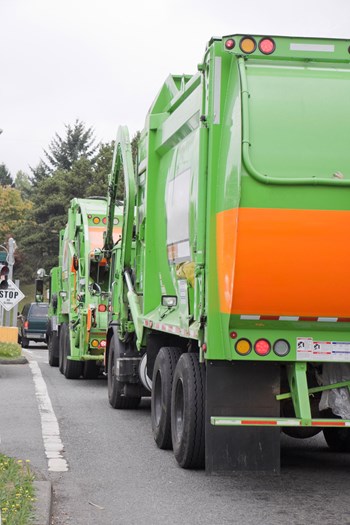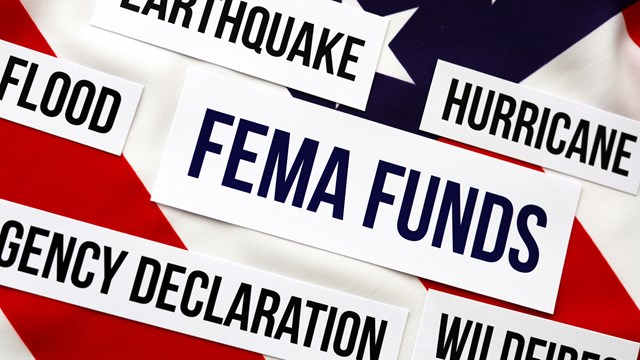
Let’s imagine that your boss invites you to a group dinner to celebrate her recent promotion. At dinner, you have a tasty salad and one glass of the house red, but your colleagues all have multiple cocktails; somebody orders the surf-and-turf, and all of a sudden, desserts start appearing. Then the check comes, and your heart sinks as “Let’s just split it five ways” quickly becomes the consensus. Why should you subsidize Jim-from-Accounting's steak? You didn't eat any of it, and he makes way more money than you do anyway.
If a skewed dinner bill is enough to make you fume, imagine sorting out the obligations, reimbursements and guidelines of municipalities versus homeowners associations when it comes to things like road and street maintenance, garbage and snow removal, and other civil necessities. Some states mandate how cities, towns and villages must handle the division of expenses between municipality and private HOAs...others like Illinois don't. It's an issue that can divide communities and cost condo owners a pretty penny.
Different Strokes...
Condos and HOAs in different regions around the country approach the issue of divvying up the aforementioned tasks in different ways. In New Jersey, for example, that state's Municipal Services Act (referred to hereafter as the “Act”) provides qualified private communities with maintenance services, or reimburses those communities for the cost of obtaining them elsewhere. The Act covers removal of snow, ice and other obstructions from the roads and streets; lighting of the roads and streets (to the extent of payment for the electricity required, but not including the installation of maintenance of lamps, standards, wiring or other equipment), and collection and disposal of leaves and recyclable materials, as well as solid waste along the roads and streets.
According to attorney Eric F. Frizzell, a partner with the law firm of Buckalew Frizzell & Crevina, LLP in Glen Rock, New Jersey, “The Act is intended to help eliminate double payment for these services by residents of qualified communities who pay for them both through their property taxes and association common charges.”
“The vast majority of condominiums and other community associations in New Jersey are 'qualified' under the Act’s definition,” Frizzell continues. “They're residential condominiums, cooperatives, or communities in which the cost of maintaining the roads and providing essential services is paid for by a not-for profit entity, such as a condominium association, consisting exclusively of unit owners who do not receive any tax abatement or exemption related to construction.”
If you are reading this in the Garden State with visions of shovels and garbage men dancing in your head, wondering if your HOA or co-op qualifies, the implementation of the Act is not black and white. As David J. Byrne, an attorney and a partner with the law firm of Ansell Grimm & Aaron, PC in Ocean Township, New Jersey explains, “The Act’s implementation is not connected with a qualified private community’s bylaws or other governing documents. To the extent that a relevant site plan approval, planning board resolution(s) and/or developer's agreement contemplates any additional services [beyond those afforded by the Act] I suppose that community’s documents could reference and/or address the relevant process. As for the Act, the municipality is supposed to decide whether to either provide the particular service, or reimburse for it. If it decides the latter, the Act requires that the community and municipality make and execute a Reimbursement Agreement.”
Calculating the reimbursement and amount proposal varies, so homeowner associations can and should take part in negotiations carefully and cautiously to get the most bang for their buck. According to the pros, a municipality does not get to unilaterally dictate the scope, or the reimbursement amount of any service—the municipality is empowered to elect whether to provide a particular service or reimburse for it; it's the Act itself that governs the scope of the service and the amount of any reimbursements.
Ronald L. Perl, Esq., a partner with the law firm of Hill Wallack, LLP in Princeton, New Jersey adds, “Each municipality is different. For example, some municipalities do not provide solid waste removal. In those municipalities, all homeowners—including those in associations—pay privately. The law gives the municipality the option of providing the service or reimbursing the association. If the service is provided, the association may be required to pay the cost of any insurance riders required to cover the vehicles while performing services on the HOA's private property. With regard to something like street lighting, some municipalities transfer the electric service for the qualifying lights to a separate account and the association pays for them directly. Other municipalities will reimburse an HOA per light fixture in an amount equal to what the municipality pays for the public streetlights.”
Frizzell offers another, perhaps less-desirable example: “Some municipalities have offered associations snow removal reimbursement that's limited to a pro-rated portion of the wage paid to a public works employee for the few minutes he drives the municipal snow plow through the association’s premises. An association should firmly reject this kind of low-ball offer and demand that the reimbursement include a fair allocation of all of the municipality’s direct and indirect overhead costs that are in any way attributable to snow removal, such as supervisory and administrative personnel costs, chemical de-icing agents, capital costs and fuel for snow plows, trucks, and salt spreaders, a share of employee health insurance, pension, and other benefits, and overtime...The association should request the municipality to provide a detailed explanation of how it arrived at its total costs, and a copy of its annual audited financial statements or other acceptable supporting documentation.”
When Things Go Wrong
Once negotiations have taken place and the agreement has been finalized, disputes can of course still occur. “Unfortunately, municipalities quite often violate the Act,” says Byrne, “whether that violation is a municipality’s failure to provide a service, reimburse for a service and/or reimburse correctly for a service. In those instances, qualified private communities often try to secure the municipality’s compliance via informal and/or political means. If that fails—and it often does—some communities will sue the municipality seeking damages arising from violation of the Act, along with a court order declaring that municipality’s Act-related obligations going forward.
“Many qualified private communities, when faced with a municipality’s violation of the Act, simply resolve to accept whatever the municipality is offering, lest it incur legal and other professional fees in litigation,” says Byrne. “The Act does not provide for a qualified private community’s recovery of its legal and/or other professional fees, even it the community is completely victorious. Municipalities are aware of that, and of a community’s general reluctance to litigate in furtherance of its rights, and rely upon it all when deciding to violate the Act.”
Other Markets, Other Issues
Up to this point, we've been talking about New Jersey—which has the benefit of having the Act to spell things out and hold municipalities accountable for either providing services, or reimbursing for them. But what if your HOA is in a state that doesn't have similar legislation?
That's exactly what's up in Illinois, where issues have arisen over the issue of condominium and HOA board members essentially paying double for public works services like snow removal and land management. Julie Cramer, an owner and board member in a condo association in Westmont, is dealing with just such an issue.
“In my case, not only does the village not provide services, but our association provides services to the village,” she says. “We have a 15-acre detention pond for stormwater that's situated entirely on association common property. Many associations have these types of ponds—there's no problem with that. But in addition to runoff from our association, the village also channels runoff into the pond—from a nearly 600-acre watershed that's completely outside of our association. The association provides 100 percent of the maintenance for the pond; the village pays zero. That means our association homeowners are providing—and financing—this public service to the village. The village claims they have no responsibility to maintain the pond because it's on private property.”
This would be irksome enough, Cramer continues, but because of increased development in the area over the last 30 years, the detention pond has become overburdened, and overflowing stormwater has eroded properties within the HOA—and even caused the Federal Emergency Management Administration (FEMA) to rezone its floodplain maps to include homes in the association. “The final insult is that the village recently passed a half-percent sales tax on all sales within the village, solely for the purpose of stormwater management,” says Cramer. “They get that sales tax and use it for other parts of the village, but we are still draining 600 acres for them, and at no cost to them!”
Lee Tate is another homeowner/board member in Park Ridge, Illinois, whose HOA is also dealing with that state's lack of reimbursement guidelines. “Park Ridge Pointe is a medium-sized neighborhood comprised of 221 condos and 61 town homes. We pay hundreds of thousands of dollars annually for snow plowing, street and curb maintenance, streetlights, flood control, as well as other services which should be paid for by our taxes.”
When one of the development's fire hydrants began leaking last year, says Tate, “The city refused to repair it. Since we considered it to be a life safety issue, we paid for repairs out of our reserves.”
An Issue of Fairness
So what's to be done in regions of the country where there is no equivalent of New Jersey's Municipal Services Act?
According to the pros, contacting local elected officials and appearing at local government meetings is perhaps the best place to start negotiations—though results definitely vary. “This is a money issue,” says Tate, with cities often seeming more concerned with cost-cutting than with fairness. “I've appeared before the city council, appealed to our alderman, and tried to get other association boards interested. I am amazed that more condo owners are not outraged at the unfairness of this issue.”
If your state does have laws on the books mandating municipal provision of/reimbursement for services, “Often the only remedy when a municipality refuses to meet its obligation is, unfortunately, a lawsuit,” says Perl. “There are reported judicial decisions involving municipal services. For example one case determined that where parking lots are actually used as interior streets, the traveled portion of those lots must be included in the snow reimbursement calculation.”
If your state doesn't have a Municipal Reimbursement Act equivalent, you're frankly facing something of an uphill battle. “Some HOAs have threatened a lawsuit, but that's going nowhere,” says Tate. “Another big part of the problem is that neither the city, nor realtors, or even the state laws require that potential buyers be notified that their taxes won't pay for services that municipalities provide to 'conventional' neighborhoods. I thought the new ombudsman law might have an effect, but it has not been funded, so will likely have no impact.”
Securing your association’s municipalities benefits—or battling the lack thereof—can be exhausting, but the savings are worth the challenge, provided you've got the stamina (and funds) to take the issue to court, or to your local and state representatives. If you do, consider it excellent practice for how to handle it the next time you're out with coworkers and the guy who orders the surf-and-turf is the same guy who suggests splitting the bill five ways.
Rebecca Fons is a freelance writer and a frequent contributor to The Chicagoland Cooperator.






Leave a Comment